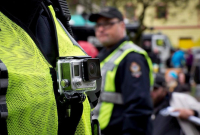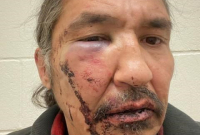Support strong Canadian climate journalism for 2025
Federal Indigenous Services Minister Marc Miller gave a short response when asked about an investigation that found an RCMP officer did not intentionally hit a young Inuk man with his truck door during an arrest in June.
"I saw what I saw," Miller told a news conference Wednesday.
A video of the arrest posted on social media showed a Mountie in Kinngait, Nunavut, knocking down an intoxicated man using the door of a police pickup. The Ottawa Police Service, which conducted a criminal investigation into the takedown, ruled the arrest was "lawful" and the officer hit the man with his truck unintentionally.
Back in June, Miller decried the improper tactic and called the incident "dehumanizing" and "disgraceful."
On Wednesday, Miller said there is a need to reform the RCMP and address systemic racism against Indigenous people in Canada.
"We will continue to hold those who serve and protect Canadians to account, making sure that we reform the RCMP," he said. "We do need to get to the bottom of these things. It further undermines the trust that, (in) Indigenous communities in particular, is still quite thin in respect to our police services."
Timoon Toonoo, Kinngait's mayor, told The Canadian Press he can't comment on the arrest until the RCMP's internal investigation is complete. The Civilian Review and Complaints Commission for the RCMP is also conducting an investigation.
Toonoo said the RCMP met with him on Tuesday to discuss the Ottawa Police Service report's findings, but he can't talk about it yet.
"They were saying that they could not charge the person who ran over the person because they do not find that person broke the law. We were on the line for a while and we talked about what happened and not much news came out of the meeting," Toonoo said.
Toonoo said he's tried to reach out to the man hit by the truck door in the video, but hasn't been able to reach him.
The Canadian Press has also reached out to the man, but has not heard back.
In a statement, Nunavut Justice Minister George Hickes said he also can't comment on the investigation, but said the arrest "was very unfortunate" and "I sincerely hope the individual struck by the vehicle is doing well."
"I understand this event caused a great deal of concern in the community and across the territory, and I recognize we have more work to do to promote reconciliation between the police and Inuit in Nunavut," Hickes said.
Timothy Bryan, a sociology professor at Dalhousie University, said regardless of the investigation's outcome, the arrest was not good police work.
"This is not what policing should look like. But there is no comment on that at all in the statement from the Ottawa police. I think it gives the impression that since there was no criminal wrongdoing, there was no wrongdoing. And I think that’s a dangerous tone to set," Bryan said.
Hickes noted that Nunavut introduced legislation in the fall that would allow it to use civilian groups to investigate allegations against officers instead of other police forces.
On Monday, RCMP in Iqaluit also started wearing body cameras as part of a national pilot project to promote police accountability.
Bryan said while Nunavut's efforts are steps in the right direction, there needs to be more transparency from investigators like the Ottawa Police Service.
He said continuing the cycle of "police-on-police" investigations that only look at criminal conduct does a "disservice" to Indigenous and other racialized communities.
"There will come a time when the people in those communities require assistance from police and may not call for it. It’s not just that the policing needs to do no harm, it’s that policing ought to be helpful," he said.
Since Jan. 1, there have been six serious encounters involving police in the territory, including two deaths.
This report by The Canadian Press was first published Dec. 2, 2020.





Comments